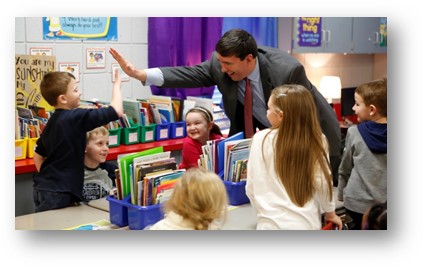Seeking a New Way to Assess Science at All Levels
By Cindy Workosky
Posted on 2017-09-26
The word assessment can prompt feelings of dread, mistrust, or outright hate in many teachers. That’s distressing, as quality instruction includes quality assessment. Unfortunately, we have allowed assessment to become the “tail that wags the dog.” The development of the Next Generation Science Standards (NGSS) was a tremendous step forward in attempting to change that and recover students’ excitement and curiosity about science.
 I view assessment from two perspectives. First, as leader in developing the NGSS, I know the intent of the Framework for K–12 Science Education and the lead states. Second, as Commissioner of Education for Kentucky, I am responsible for creating an environment that ensures students are receiving a quality education. While these positions give me two different lenses for viewing education, I believe that together they offer a specific way to approach three- dimensional assessment.
I view assessment from two perspectives. First, as leader in developing the NGSS, I know the intent of the Framework for K–12 Science Education and the lead states. Second, as Commissioner of Education for Kentucky, I am responsible for creating an environment that ensures students are receiving a quality education. While these positions give me two different lenses for viewing education, I believe that together they offer a specific way to approach three- dimensional assessment.
First, let’s consider the intent of the standards. I believe that traditional science testing has removed the creativity and joy from science teaching, resulting in students who fail to experience the joy of learning science and don’t develop the ability to think critically about the world around them. When we crafted the NGSS, we had a clear understanding that the standards would “break” many of the current psychometric models, including the notions that one standard equals one multiple-choice item and that we can only test content. If we approach state assessment from the standpoint intended by the states and the writers, then we must have the courage to seek a new way to approach state assessment.
So what was the standards’ intent beyond changing how we think about assessment? I think it’s important to note that the standards were not intended to focus on state assessment exclusively; they were, in fact, meant to refocus instruction. Throughout the implementation process, our most important message to states was not to proceed to assessment too quickly; instruction must come first. (Please note I have a reason for referring specifically to states, which I’ll explain shortly.)
This sequence was intentional and meant to emphasize that instruction was the critical first step, and state assessment would follow. I contend it’s time for us to realize that as educators, we must consider the business of instruction first. If we do our jobs, state assessment will take care of itself. The best test prep is good instruction, but if we focus solely on the facts of science as we have done for years, test prep will remain static. I understand that much of science assessment drives how we manage instruction. This is why states must take the development of new assessments seriously and consider the intent of the standards as they do so.
A final point is the integration of quality instruction and quality assessment. I stated earlier that state assessment follows instruction. This is true because quality instruction also requires quality assessment at all levels. In other words, as the National Research Council has noted in its consensus study on Developing Assessments for the Next Generation Science Standards, a system of assessments must be employed to properly align instruction with assessment. Indeed, students should actually learn from these assessments, as well as receive feedback on their own progress.
We have done this in Kentucky, and in the past year, I have witnessed extraordinary instruction, especially at the K–8 level. Our system of assessments consists of classroom-embedded assessments, tasks, and a state assessment. We strive to make clear that local assessments are just as important. They are not part of accountability, but they help determine whether practice changes. The feedback we have received from students shows they learned from the tasks, as did the teachers.
Assessment should not be something the state does; it should be part of a system that values teachers and their instruction, provides quality feedback to both teachers and students, and engages students in phenomena and engineering that allow them to appreciate the scientific process. I am committed to these ideas, and we will emphasize them in Kentucky, in all areas. I am also collaborating with other chief state school officers and their staff to improve science education for all students, and I am excited about our future. If we are to succeed in providing the best science education in the world, we must remember three necessary ingredients: quality instruction, quality assessment at all levels, and teachers who have the courage to instruct and assess differently.

Stephen L. Pruitt
Stephen L. Pruitt is the Commissioner of Education for the state of Kentucky. He started his education career as a high school chemistry teacher in Georgia, and later held several positions at the Georgia Department of Education. Before coming to Kentucky, Commissioner Pruitt served as senior vice president for Achieve, Inc., a nonpartisan education reform organization in Washington, D.C., where he coordinated the development of the Next Generation Science Standards. He holds a bachelor’s degree in chemistry from North Georgia College and State University, a master’s degree in science education from the University of West Georgia, and a Doctorate of Philosophy in chemistry education from Auburn University.
This article was featured in the September issue of Next Gen Navigator, a monthly e-newsletter from NSTA delivering information, insights, resources, and professional learning opportunities for science educators by science educators on the Next Generation Science Standards and three-dimensional instruction. Click here to sign up to receive the Navigator every month.
Visit NSTA’s NGSS@NSTA Hub for hundreds of vetted classroom resources, professional learning opportunities, publications, ebooks and more; connect with your teacher colleagues on the NGSS listservs (members can sign up here); and join us for discussions around NGSS at an upcoming conference.
The mission of NSTA is to promote excellence and innovation in science teaching and learning for all.
Future NSTA Conferences
2017 Fall Conferences
National Conference
Follow NSTA
Disclaimer: The views expressed in this blog post are those of the author(s) and do not necessarily reflect the official position of the National Science Teaching Association (NSTA).


